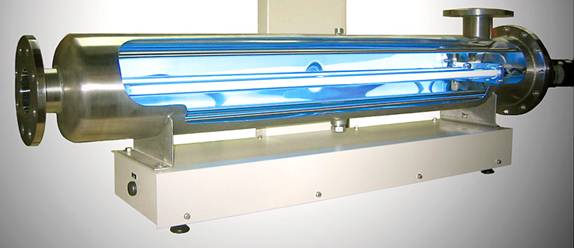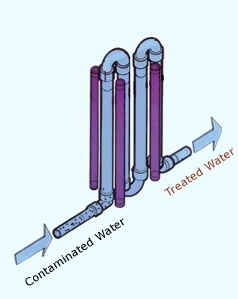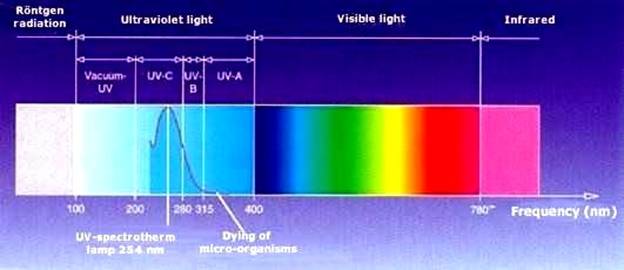| Products > Water Disinfection >Non-Chemicalized Disinfection >> |
|
| UV Sterlizer:- |
 |
|
| |
 |
| |
| Introduction:- |
 |
|
| |
| Ultraviolet Sterilizer provides a safe means of water Purification, which has been a proven process for many years. This method is now widely recognized and accepted as the concern of bacterial contamination has increased.Commercial ultraviolet disinfection systems are specifically designed to treat microbiologically contaminated ground or surface waters. These disinfection systems offer a 4-log reduction (99.99%) in bacteria, virus and protozoan cysts (specifically giardia lamblia and cryptosporidium). This UV process is quick, simple, inexpensive and environmentally friendly as it does not add anything to your water and creates no disinfection by-products. The most ecological way of treating your water. |
| |
| Basic Structure :- |
 |
|
| |
| We provide optimum quality UV sterilizers that are manufactured using qualitative SS 316 as raw material and electro polished internally as well as externally for corrosion free services. Our UV system allows water to come in contact with Ultra Violet rays having 30,000 micro watts second/cm2 UV dosage & 2537 Angstrom (254 nm) units wavelength. The silica quartz jacket provides 100% efficiency due to its pure crystal clear transparency as compared to the Teflon tubes which has only 25% transparency. |
| |
|
| |
Working Principle:- |
 |
|
| |
As water flows past the UV lamp(s) in a UV disinfection system, microorganisms are exposed to Ultraviolet light energy at a 253.7nm wave length. Ultraviolet light alters the DNA material in cells so that bacteria, viruses, molds, algae and other microorganisms can no longer reproduce. The microorganisms are considered dead, and the risk of disease from them is eliminated. These Ultraviolet Disinfection Systems are designed for commercial & industrial applications. The process of UV Disinfection is accomplished without adding any harmful chemicals to your drinking water and does not distort the water or effect its pH value. UV Disinfection has an effective kill rate of 99.99% of most living microorganisms such as bacteria & viruses.
 |
Ultraviolet dosage required to destroy greater than 99.9% of micro-organisms. Measured in microwatt seconds per centimeter squared.
BACTERIA
| Agrobacterium tumefaciens |
8500 |
| Bacillus anthracis |
8700 |
| Bacillus megaterium (vegatative) |
2500 |
| Bacillus subtills (vegatative) |
11000 |
| Clostridium Tetani |
22000 |
| Corynebacterium diphtheria's |
6500 |
| Escherichia coli |
7000 |
| Legionella bozemanii |
3500 |
| Legionella dumoffil |
5500 |
| Legionella micdadel |
3100 |
| Legionella longbeachae |
2900 |
Legionella pneumophilla
(legionnaires disease) |
3800 |
Leptospira intrrogans
(Infectious Jaundice) |
6000 |
| Mycobaterium tuberculosis |
10000 |
| Neisseria catarrhalls |
8500 |
| Proteus vulgaris |
6600 |
| Pseudomonas seruginosa (laboratory strain) |
3900 |
| Pseudomonas aeruginosa (environmental strain) |
10500 |
| Rhodospirllum rubrum |
6200 |
| Salmonella enteritidis |
7800 |
| Salmonella paratyphi (enteric fever) |
6100 |
| Salmonella typhimunum |
15200 |
| Salmonella typhosa (typhoid fever) |
6000 |
| Sarcina Lutea |
26400 |
| Seratia marcescens |
6200 |
| Shigella dysenterai (dysentery) |
4200 |
| Shigella Flexneri (dysentery) |
3400 |
| Shigella sonnell |
7000 |
| Staphylococcus epidermidis |
5800 |
| Staphylococcus aureus |
7000 |
| Streptococcus faecalls |
10000 |
| Streptococcus hemolyicus |
5500 |
| Streptococcus lactis |
8800 |
| Viridans streptococci |
3800 |
| Vibrio cholerae |
6500 |
YEAST
| Bakers yeast |
8800 |
Brewers yeast |
6600 |
Common yeast cake |
13200 |
MOLD SPORES
| Penicillum digitatum (olive) |
8800 |
Penicillum expensum (olive) |
22000 |
PeniciHum roqueforti (green) |
26400 |
ALGAE
| Chlorella vulgaris (algae) |
22000 |
VIRUSES
| Bacteriophage (E. coli) |
6600 |
Hepatitis virus |
8000 |
Influenza virus |
6600 |
Pollovirus (pllomyelitis) |
2100 |
Rotavirus |
2400 |
|
| |
Applications:- |
 |
|
| |
- Well water treatment
- Manufacturing plants
- Agriculture
- Private wells
- Camp grounds
- Hotels
- Bottlers
- Aquaculture
- Hospitals
- Food
- Restaurants
- Breweries
- Laboratories
- Marine
- Pharmaceutical
- Dairies
Effective in killing off bacteria and viruses such as:
- Coliform Bacteria
- Leptospira Interrogans (Infectious Jaundice)
- Salmonella Typhosa (Typhoid Fever)
- Bacteriophage (E. coli)
- Hepatitus Virus
- Chlorella Vulgaris
- Influenza Virus
- Legionella Pneumophila (Legionnaires' Disease)
|
| |
Advantages:- |
 |
|
| |
- More effective against viruses than chlorine - Chlorine is becoming less acceptable because of harmful byproducts, handling problems, & risk of overdosing.
- Immediate treatment process, no need for holding tanks, & retention times, so footprint is small.
- Extremely economical due to low capital, operational & maintenance costs.
- No chemicals added to the water supply – resulting in no byproducts & no need for specialized storage requirements
- No change in taste, odor, pH, conductivity of water
Automatic operation
- Simplicity and ease of maintenance, periodic cleaning, and annual lamp replacement, no moving parts to wear out
- Easy installation, only two water connections and a power connection
- Compatible with any water treatment processes, (i.e. RO, filtration, and softening). - UV does not alter taste, odor, color or pH of the water
- UV does not require the addition of chemicals
- UV does not impart toxic by-products into the water
- UV systems are compact and easy to install
- UV systems require very little maintenance
- Running costs are often lower than those of a household light bulb
|
| |
| |
|



